freebasics
Latest

Facebook's Free Basics quietly pulled from Myanmar, other markets
Facebook's controversial Free Basics service quietly disappeared from several markets over the past few months, according to The Outline. One of those countries is Myanmar, where it was accused of supporting ethnic cleansing and where it became the target of criticisms for the way it handled a chain letter that caused widespread panic. The letter warned Buddhists that Rohingya Muslims were going to attack them, while Rohingya Muslims were told to be prepared for violence from militant Buddhist groups. Facebook chief Mark Zuckerberg used the incident as an example of the social network's effectiveness in tackling hate speech to the consternation of Myanmar activists who said they had to repeatedly flag the letter to get the company to act on it.
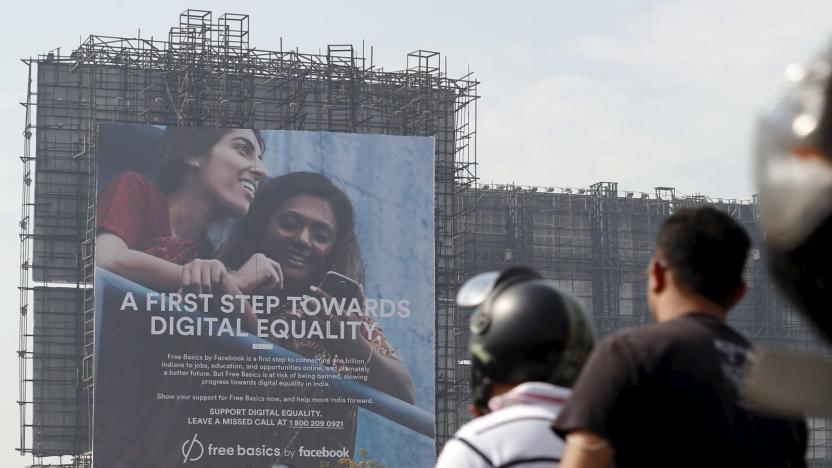
Case study finds the drawbacks of Facebook's 'free' internet
Facebook's successor to its Internet.org "web for all" service, Free Basics, has had a troubled rollout. India notoriously shut it out of the country back in February 2016 for violating net neutrality (prioritizing Facebook services), with Egypt blocking it months later over privacy concerns. Still, the social titan has deployed Free Basics' free internet to 63 countries in Africa, Asia and Latin America -- and wants to bring it to the United States soon. But a report released today criticizes the service's shortcomings and claims its decision to allow access to some sites but not others violates net neutrality.
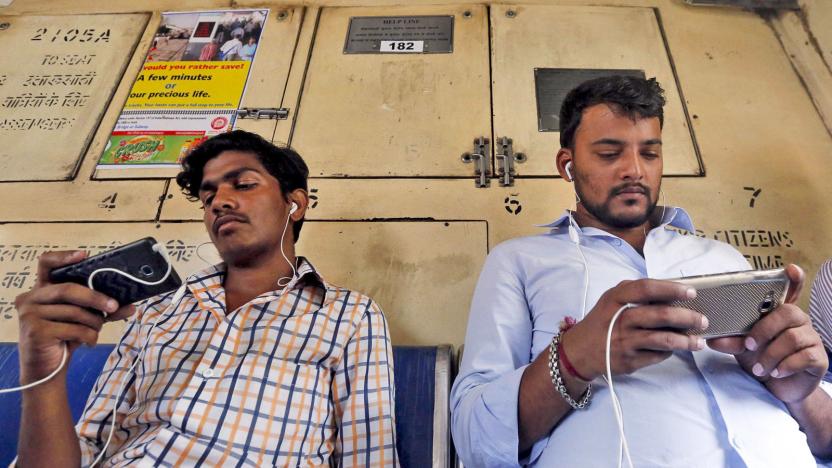
Facebook begins selling low-cost WiFi in India
Facebook's internet.org is on a mission to bring connectivity to the most remote communities on Earth. And while moonshot projects like Aquila are still in early development, the company is pushing forward with a different strategy: empowering local entrepreneurs to resell internet hotspots through its Express WiFi program, which just officially launched in partnership with Indian telecom Bharti Airtel.
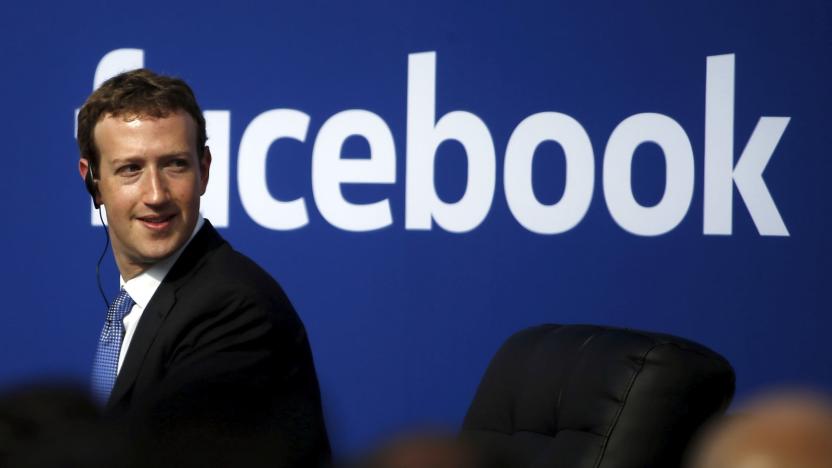
Facebook is trying to bring its basic internet services to the US
Facebook initially launched "Free Basics" as a way to bring basic internet services to countries with limited or no traditional internet connectivity, but now it sounds like the company is working with the White House to bring the program to the US for the first time. According to the Washington Post, Facebook is actively exploring how it can bring Free Basics to "low income and rural Americans" who can't afford broadband internet either at home or through a smartphone. But the catch will be doing so without attracting the regulatory attention that got Free Basics banned in India earlier this year.
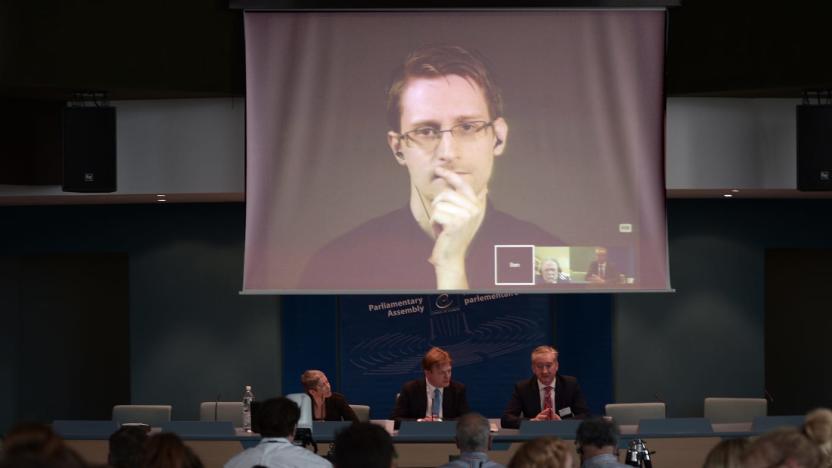
Recommended Reading: Snowden on the untapped power of the press
Snowden Interview: Why the Media Isn't Doing its Job Emily Bell, Columbia Journalism Review NSA whistleblower Edward Snowden sat down with the Columbia Journalism Review (virtually, of course) to discuss the power of the press, using social media to fight terrorists and the concept of a global counter-terrorism task force with universal jurisdiction.

Egypt blocked Facebook's Free Basics over surveillance requests
Facebook was forced to abandon its Free Basics program in Egypt after refusing to facilitate government surveillance, according to a report by Reuters. The news agency refers to two unnamed sources who are supposedly familiar with the matter, each confirming the disagreement and its relation to the shutdown last December. Free Basics had only been available for two months, through an agreement with the domestic carrier Etisalat. The service is part of Facebook's internet.org, an initiative which provides free access to some "basic" applications including Facebook. Reuters' report is light on detail. It doesn't mention when the talks took place or what type of access the government was requesting. What is clear, however, is that Facebook refused to comply with the demands. Facebook and Etisalat are yet to comment on the matter. Mohamed Hanafi, a spokesperson for Egypt's Ministry of Communication, gave Reuters a different explanation, however. He said it was a regulator's decision: "The service was offered free of charge to the consumer, and the national telecommunication regulator saw the service as harmful to companies and their competitors." Since the closure, Facebook's internet.org has been forced to pull out of India too. That decision, however, was due to wider criticisms about Free Basics and its effect on net neutrality. By supplying free access to a select group of services, the argument goes that Facebook was discouraging alternative sites and apps. As a result, not all data was being treated equally -- an action that breaks the spirit of net neutrality. India and Egypt are massive markets, but it doesn't spell the end of Free Basics just yet. The service is still live in 37 countries, including Thailand and Mexico.
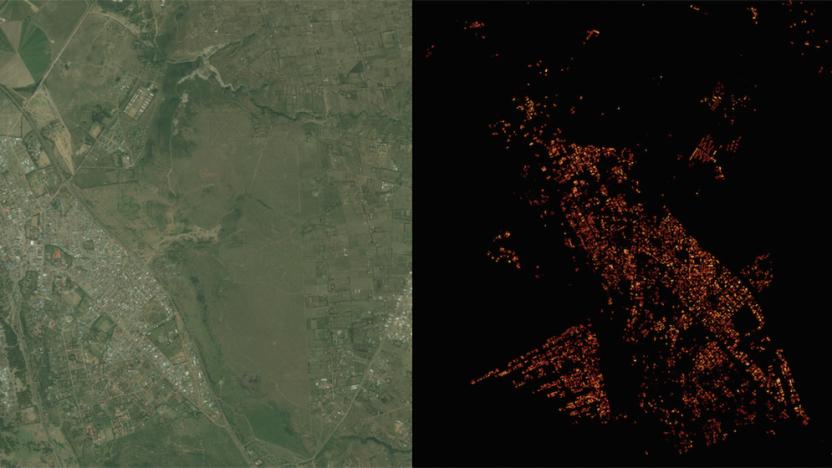
Facebook created a super-detailed population density map
Facebook's quest to get the world online is paying some unexpected dividends. Its Connectivity Lab is using image recognition technology to create population density maps that are much more accurate (to within 10m) than previous data sets -- where earlier examples are little more than blobs, Facebook shows even the finer aspects of individual neighborhoods. The trick was to modify the internet giant's existing neural network so that it could quickly determine whether or not buildings are present in satellite images. Instead of spending ages mapping every last corner of the globe, Facebook only had to train its network on 8,000 images and set it loose.

Facebook roasts board member's attack on 'anti-colonialism'
Venture capitalist (and Facebook board member) Marc Andreessen is known for being outspoken on tech issues, but he's learning the hard way that he went one step too far. Facebook's Mark Zuckerberg has chastised Andreessen for claiming that India's valuation of net neutrality (such as the rejection of Facebook's Free Basics service) was part of an "anti-colonialism" mindset that had hindered the country "for decades" after it declared independence in 1947. Yes, the implication was that the country should harken back to the days of British colonial rule and accept outside influence. Not surprisingly, Zuck finds this idea "deeply unsettling" -- whatever Facebook wants, it has to respect India's culture, history and values.

Facebook's free internet service shut down in Egypt
Last week, regulators in India clamped down on Facebook's Free Basics in the country, and now Egypt is doing the same. The Associated Press reports that the program the social network launched with Etisalat Egypt two months ago was shut down today. In a statement to the AP, Facebook said that it hopes the issue is resolved soon, so that the nearly one million people that were previously without internet will have access restored.

India puts the kibosh on Facebook's 'Free Basics'
India's Telecom Regulatory Authority (TRA) has called on Reliance Communications, Facebook's Indian telecom partner, to halt the company's controversial "Free Basics" mobile Internet program (aka Internet.org) over concerns that it violates the tenets of net neutrality. Free Basics affords more than a billion people in India who would not otherwise have internet, access to select websites and services including online shopping and health sites, Wikipedia and, of course, Facebook. However, the regulatory agency has taken umbrance with Facebook's "walled garden" approach -- wherein access to the actual Internet comes through a Facebook-branded portal (a lot like AOL's old America Online service).

Facebook to beam free internet to Africa via satellite
Facebook has made it clear that satellites will play a big role in delivering its free internet initiative to people across the globe, but talk of a rollout has been pretty limited. That changed today after the company announced it's teamed up with French communications specialist Eutelsat to beam connectivity to more than 14 countries in the most densely populated parts of Sub-Saharan Africa.

'Free Basics by Facebook' replaces Internet.org website and app
A few months ago, Facebook opened up the Internet.org platform to developers after being accused of violating net neutrality rules, mostly by users in India. Now, Zuckerberg's project has added 60 new services created by third-party developers, including BabyCenter for pregnancy and parenting info and SmartBusiness for novice entrepreneurs. Since it has undergone quite an overhaul, it has also been renamed to "Free Basics by Facebook" to distinguish it from the larger Internet.org initiative. The revamped website comes with a menu where its users in Asia, Africa and Latin America can choose which services to activate and access. In addition, the new mobile website -- now FreeBasics.com instead of Internet.org -- supports HTTPS just like the Android app does. Note that the platform is still open to developers, and those interested in helping out can get all the details from the Internet.org platform page on Facebook.







